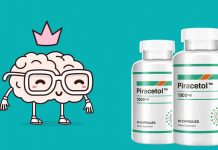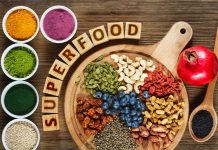
Testosterone levels peak around age 18, but soon begin a steady decline. By age 30 the level of free testosterone in your blood will be ten percent lower than your peak level and then begins a more rapid decline of one percent per year. Low levels of testosterone can cause sexual dysfunction, infertility and impotence, mood swings and depression, and physical changes including increased body fat and decreased muscle mass and bone density.
You do not need to sit back and accept this decline in your testosterone, you can’t stop the decline, but there are ways to replace the loss, to increase your testosterone levels naturally:
1. Healthy Eating
Your diet has a major impact, both positive and negative, on your testosterone level as well as other hormone levels. First, you can increase your body’s natural production of testosterone by providing the simple ingredients your body needs to produce it. Testosterone is composed primarily from healthy fats and fatty acids or cholesterol in the absence of healthy fats, plus zinc, and Vitamin D. Adding natural sources of these nutrients to your diet will provide the ingredients necessary for testosterone production.
Eat healthy fat and fatty acids from fish, avocados, olive oils, nuts and seeds. Your body also uses cholesterol to produce testosterone, add eggs to your diet as they contain cholesterol but also provide complete proteins and all essential amino acids. You will need Vitamin D and zinc found in meat, fish and many dairy products like milk, cheese, yogurt and kefir.
Vitamin D supplements and exposure to sunlight may help boost testosterone levels, especially in loss related to aging or those who have low blood levels of vitamin D. The combination of fatty acids, Vitamin D and zinc have the strongest clinical evidence as testosterone boosters. People who exercise moderately and regularly have higher testosterone levels than those who do not. All forms of exercise may increase your testosterone levels, however, weight lifting and high-intensity interval training have been found to be most effective.
2. Exercise
Exercise, and especially weight training stimulates your body to increase muscle mass and that requires the production and release of testosterone – regardless of your age. Your body adapts to the stresses you place on it. Lift a heavy weight and your body will adapt and grow in size and strength to lift it again, in this example, adapting requires testosterone and will increase production in order to meet the demand.
Concentrate on intense workouts including full-body and multi-joint movements. HIIT training, workouts with low reps using heavy weights or lighter weights and higher reps have all been shown to increase natural testosterone levels. Cardio strengthens your heart and lungs, resistance training builds size, strength and increases testosterone production.
Also read: Best anabolic support complex TestoFuel >>
3. Quality Sleep
Your body recovers and rebuilds during sleep. Ensure that you get adequate, restful, high-quality sleep. Sleep is as important for your health as diet and exercise, high-quality sleep is necessary to maintain healthy testosterone levels and optimize your long-term health.
4. Lose Weight
As you age and your testosterone levels decrease, so does your metabolism and less fat burning occurs causing your fat levels to increase. Body fat promotes MORE body fat, and the added body fat can cause an additional lowering of free testosterone and convert what little testosterone you have into estrogen. Fat is the enemy of testosterone, more fat equals less testosterone, less testosterone leads to more fat storage. The simplest way to block this fat-testosterone cycle is to reduce your body’s stored fat through healthy diet and exercise and to eat less sugar.
Foods filled with sugar and sodas cause your blood glucose to spike which then causes an immediate release of insulin. High insulin levels promote fat storage and lower testosterone levels. Constantly elevated blood sugar and the resulting high insulin levels eventually lead to insulin resistance and Type 2 Diabetes as well.
5. Reduce Stress
Stress and the hormones related to stress reduce the production and release of free testosterone. Long-term stress, which can elevate levels of the hormone cortisol which can quickly reduce testosterone. These human growth hormones work in an inverse manner: as one goes up, the other comes down. Stress and high cortisol levels can also increase your food intake, weight gain and the storage of harmful body fat around your organs.
For both optimal health and hormone levels, you should try to reduce repetitive stressful situations in your life. To naturally increase your testosterone levels – eat more of the foods your body uses to produce testosterone, train hard and stimulate testosterone production and release and eat less sugar and control your weight.
6. Herbal Remedies
There is growing research that several herbal remedies may be beneficial and increase low testosterone levels by as much as 15%. If available, start with ashwagandha, more commonly known as “Indian Ginseng” which lowers cortisol as it raises free testosterone. Ginger has also been found effective, as have horny goat weed, velvet bean (Mucuna pruriens) and shilajit.
Also read: The #1 rated HGH releaser Genf20 Plus >>
7. Avoid Estrogen
Avoid estrogen and foods and personal care products containing ingredients that mimic estrogen, these are called endocrine disruptors, hormone altering foods and chemicals. Soybeans and foods containing soy top the list of foods to avoid. Grain fed beef and dairy cattle are both fed and occasionally force fed soy, often GMO Soy.
Deodorants, lotions and skin care creams, shampoos and similar personal care products contain xenoestrogens which disrupt testosterone as they increase estrogen. These toxins are readily absorbed through the skin scalp and gums and stored in the body, Avoid products containing parabens, phthalates, 4-Methylbenzylidene, petrochemicals and triclosan and reduce your exposure to these estrogen-like chemicals, positively affecting your testosterone levels and health.





























